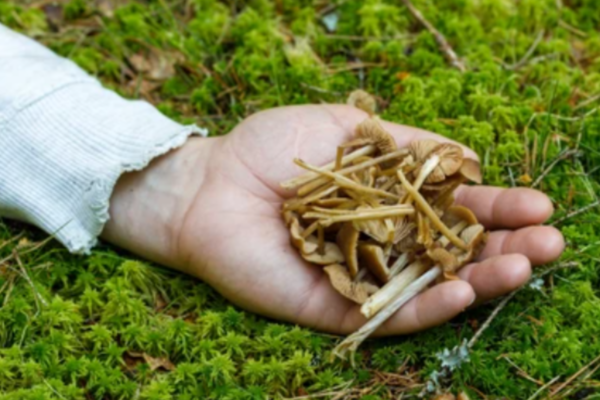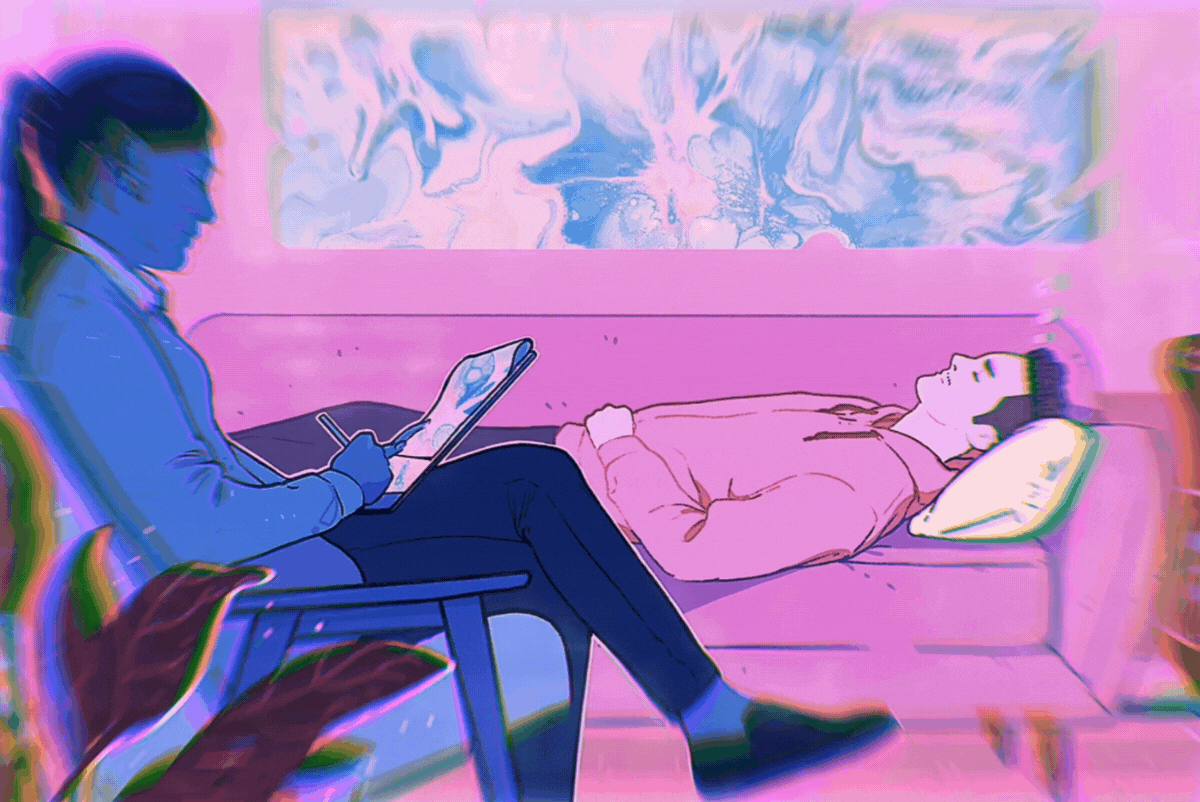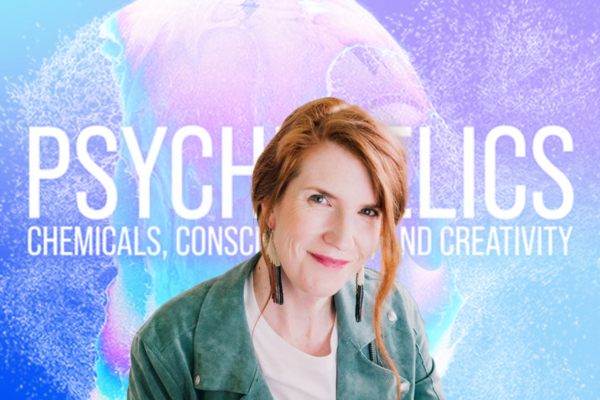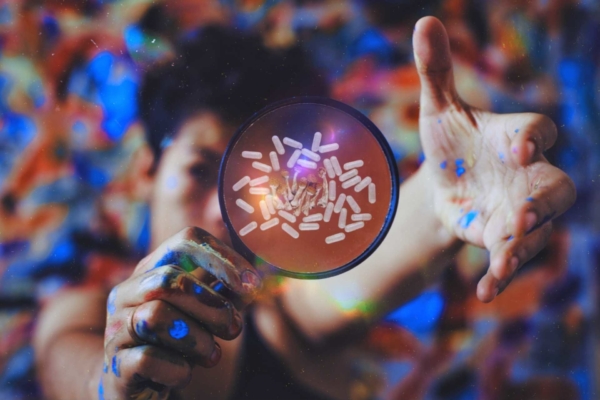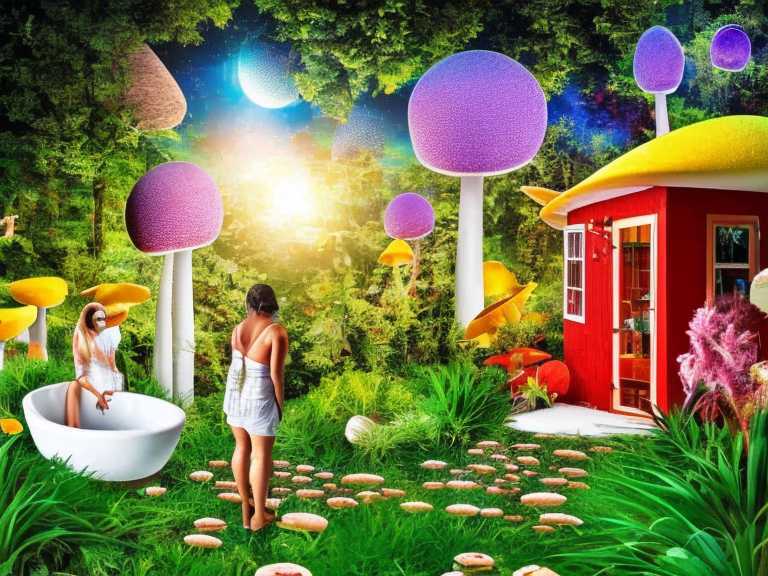
We have all experienced the familiar urge to run for our lives when our gut abruptly decides to give us a short notice that an explosion is bound to happen in our pants. Yes, I’m talking about diarrhea. Diarrhea can be caused by many factors, such as food intolerance, IBS, allergy, bacterial infection and so on. What should be added to the list of reasons for the detested bombay bottom is magic mushrooms.
Psilocybin mushrooms are becoming increasingly popular as psychedelic researchers are progressing in their quest to discover how these psychedelic wonders can potentially treat a variety of affective disorders – perhaps even better than traditional medicine. With this resurgence of interest, we are witnessing a flood shroom dispensaries populating the gray market in North America and of course, an increased use by people who want to self-medicate or to simply experience altered states of consciousness. However, while shroomers are raving about the promising benefits of psilocybin mushrooms, one cannot simply neglect the fact that wearing white pants may be out of the question for some, because, yes, shrooms can cause diarrhea.
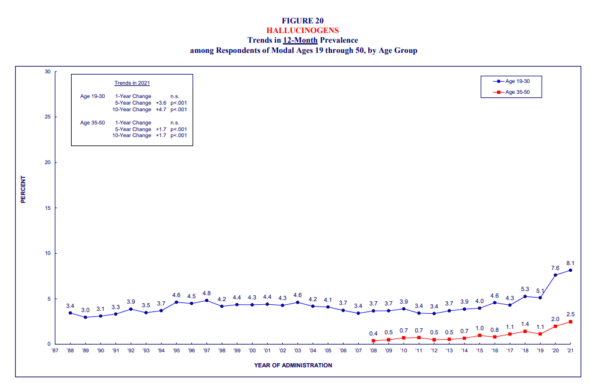
among Respondents of Modal Ages 18 through 50, 2
by Age Group
Physical Effects of Magic Mushrooms
Most research has been focused on evaluating the psychological effects of psilocybin mushrooms rather than the physical ones. This is one of the main reasons we now know that psilocybin mushrooms are not addictive, contrary to popular belief. In fact, they are researched for their anti-addictive properties and have been found to be especially effective in smoking cessation and binge drinking. Though people can develop tolerance to the psychedelic effects, shrooms do not cause physical dependence. To avoid building a tolerance, several microdosing protocols have been developed.
Read also: A Beginner’s Guide to 6 Effective Microdosing Protocols
Some of the most common physiological effects of ingesting a moderate dose (2-3.5g) of magic mushrooms are:
- Life-changing introspective or philosophical insights
- Increased flow of ideas
- Enhanced appreciation for music, art, etc.
- Finding otherwise mundane things funny or interesting
- Clear come-up, peak, and come-down
- Amplification of emotions, whether good or bad
- Open- and closed-eye visuals (e.g. patterns, auras)
- Synesthesia
- Sensitivity to light
- Compulsive yawning
- Disorientation
- Fear and anxiety (“bad trip” experiences)
- Difficulty with cognitive tasks
- Dizziness
- Nausea
Magic Mushrooms and Diet
The nausea effect can also be triggered by one’s diet and preparation before a psilocybin session. There is a reason why a good amount of psychedelic retreats suggest that the individuals preparing to undergo a psilocybin therapy should be mindful of their nutrition for at least a week before the psychedelic experience. An anti-inflammatory diet including healthy foods nutrients like fish, nuts, and fortified foods while also avoiding processed and ultra-processed foods can help alleviate some of the potential adverse effects.
The hormone and neurotransmitter serotonin’s function is to stabilize mood and promoting positive emotions. Low serotonin levels can lead to negative feelings such as sadness, hopelessness, anger, anxiety, and irritability. Why is eating foods that promote a serotogenic balance important? Well, the majority of serotonin is actually produced in our gut. Thus, an unhealthy gut can lead to some unpleasant reactions. Especially when experimenting with psilocybin mushrooms.
Tryptophan is an important amino acid found in various foods. It converts to serotonin in the brain, but vitamin D is needed to activate the gene TPH2 to enable this conversion.
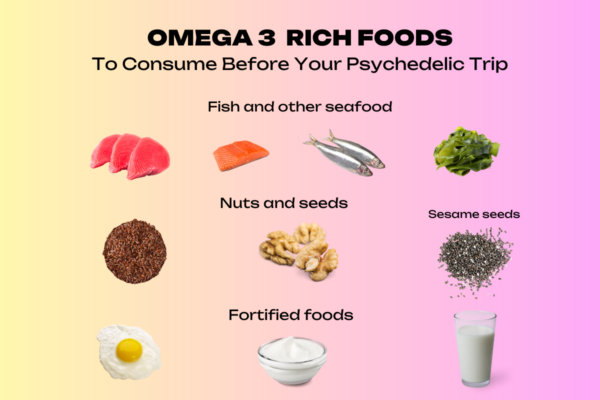
Foods containing tryptophan include:
- Oats
- Egg Whites
- Sunflower seeds
- Peanuts
- Pumpkin seeds
- Sesame seeds
- Soy beans
Read more: A Guide to Your Diet Before, During and After a Psychedelic Trip
You may also like: How Nutrition Can Improve the Psychedelic Experience
It’s also important to note that magic mushrooms can have different effects on different individuals and produce varying anxiety levels or other psychological symptoms. This highlights the need for caution when considering using magic mushrooms, even for therapeutic reasons such as cancer patients.
Can we even digest magic mushrooms raw?
Most mushrooms are indigestible when eaten raw because they are composed of some seriously strong cell walls, mainly made up of chitin. Chitin is a linear polymer of β-1, 4-N-acetylglucosamine (GlcNAC), and is among the most abundant biopolymers on the planet. It is also the second most abundant polysaccharide found in nature after cellulose. It’s observable in the exoskeleton of insects, mushrooms, yeast, and algae, and in the internal structures of other vertebrates. Although some studies have found that chitin may be able to improve gastrointestinal health thanks to its prebiotic potential, humans are unable to digest chitin on their own. Although chitin is not a protein, it acts in a similar manner to certain proteins. Instead of creating hair or nails like keratin, chitin creates a hard outer shell or protection in organisms like mushrooms, insects and clams. Animals who eat insects, unlike us, can digest chitin because they have bacteria that can break it down for them.
Because humans don’t have the same gift, we need to cook the mushrooms in order to break down the chitin and release its nutrients. Psilonauts generally recommend consuming magic mushrooms in a lemon tek or tea form to mitigate the nausea and diarrhea effects. The idea behind lemon tekking is that the acid juice breaks down chitin because its citrus juices carry a pH similar to stomach acidity – between 2 and 2.6 as opposed to 1.5 and 3.5. The dephosphorylation of mushroom enzymes intensifies because of the acidic environment. It is also speculated that lemon or lime juice can chemically convert psilocybin into its prodrug psilocin, the active metabolite that causes the psychedelic effects in magic mushrooms.
According to mushroom experts like Dr. Andrew Weil, “Mushrooms have very tough cell walls and are essentially indigestible if you don’t cook them. Thoroughly heating them releases the nutrients they contain, including protein, B vitamins, and minerals, as well as a wide range of novel compounds not found in other foods.”
Chitin also induces inflammatory and immune system responses in humans, according to a 2018 study published in the National Library of Medicine. Humans are unable to produce chitin like mushrooms do. However, our bodies produce chitinase which is an enzyme that degrades chitin by breaking down its molecules into smaller fragments. These smaller pieces can then be detected by the human body and lead to inflammatory and immune responses.
Increased serotonin levels
The way that psilocybin works is closely connected to serotonin, a crucial neurotransmitter in the brain that affects our mood and cognitive abilities. Serotonin is crucial in modulating mood, cognition, reward, learning, memory, and numerous physiological processes such as vomiting and vasoconstriction. Psilocybin has a similar structure to serotonin, mimicking its effects. However, psilocybin isn’t the source of shrooms’ psychedelic effects. Psilocybin is processed and converted by the body into its prodrug psilocin. Researchers believe that it is psilocin that triggers serotonin 2A receptors (5-HT2ARs), causing psychedelic effects in the brain.
However, according to research, 95% of the body’s serotonin is produced in the intestine and plays an important role in regulating gut motility. Hence, if serotonin production is damaged, people may suffer from chronic digestive issues like IBS, leaky gut, Candida overgrowth, or SIBO. Having low serotonin creates a vicious cycle, as serotonin is paramount for supporting proper nutrient absorption and digestion. Serotonin (5-hydroxytryptamine; 5-HT) is critical for the development and function of the central nervous system (CNS). Intestinal 5-HT modulates the enteric nervous system (ENS) development and neurogenesis, motility, secretion, inflammation, sensation, and epithelial development. If serotonin levels are low, that may lead to constipation, whereas high levels can cause diarrhea. In simpler terms, if psilocybin disrupts serotonin signaling, one may suffer from temporary diarrhea.
Serotonin Syndrome/Toxicity
Serotonin toxicity or serotonin syndrome has become a risk concern when considering combining psychedelics with psychiatric medications because of fears that it can lead to excessive serotonin levels. Too much serotonin can lead to a variety of symptoms, from nausea and anxiety to more severe, life-threatening reactions such as delirium, coma, and, sometimes, even death. Although serotonin toxicity occurs rarely, it is crucial to analyze whether some drug combinations could increase its risk, given that many psychedelics and psychiatric medications modify serotonin neurotransmission.
Read also: Can You Combine Psychedelics and Antidepressants? A Dive into Potential Interactions and Safety
Psilocybin binds to the 5-HT2A receptor, blocking the binding of serotonin to the occupied receptors. Antidepressants like SSRIs prevent the reabsorption of serotonin by the brain, once it’s released, allowing more of it to remain in the brain. Other antidepressants, like monoamine oxidase inhibitors (MAOIs), prevent the body from breaking down serotonin, other neurotransmitters, and psychedelics, effectively increasing the levels of serotonin in the brain.
As far as research knows, psilocybin, when used alone or in tandem with SSRIs, has a relatively low risk of causing serotonin toxicity because it does not cause an excessive rise in serotonin levels. Like LSD, psilocybin is a partial agonist at the 5-HT2A receptor, meaning it doesn’t fully bind to it compared to other drugs, hence the risk of serotonin toxicity is relatively low. Like with SSRIs, combining MAOIs with psilocybin is less concerning, as it may only extend the duration and intensity of their effects.
It’s important to note that other drugs like analgesics, anticonvulsants, SNRIs, antipsychotics, buspirone, and OTC cold and cough medicines containing dextromethorphan could also increase serotonin levels. Moreover, reactions may vary based on the individual. That is why we recommend talking to a physician or a psychedelic facilitator before exploring the depths to your psyche through shrooms.
Can you reduce the risk of nausea and diarrhea when taking shrooms?
Yes. Like lemon tek, shroom tea is a recommended solution that not only eases the stomach but amplifies the psychedelic experience. By boiling the mushrooms in hot water, psilocybin is extracted into the water, creating a more potent concoction and making the mushrooms easier to digest. The outcome is a faster onset of the psychedelic effects, but it also eliminates the raw mushroom material that can cause stomach discomfort. So if you’re looking for a way to elevate your psilocybin mushroom experience while reducing the risk of nausea and potentially diarrhea, shroom tea may be a great alternative.
